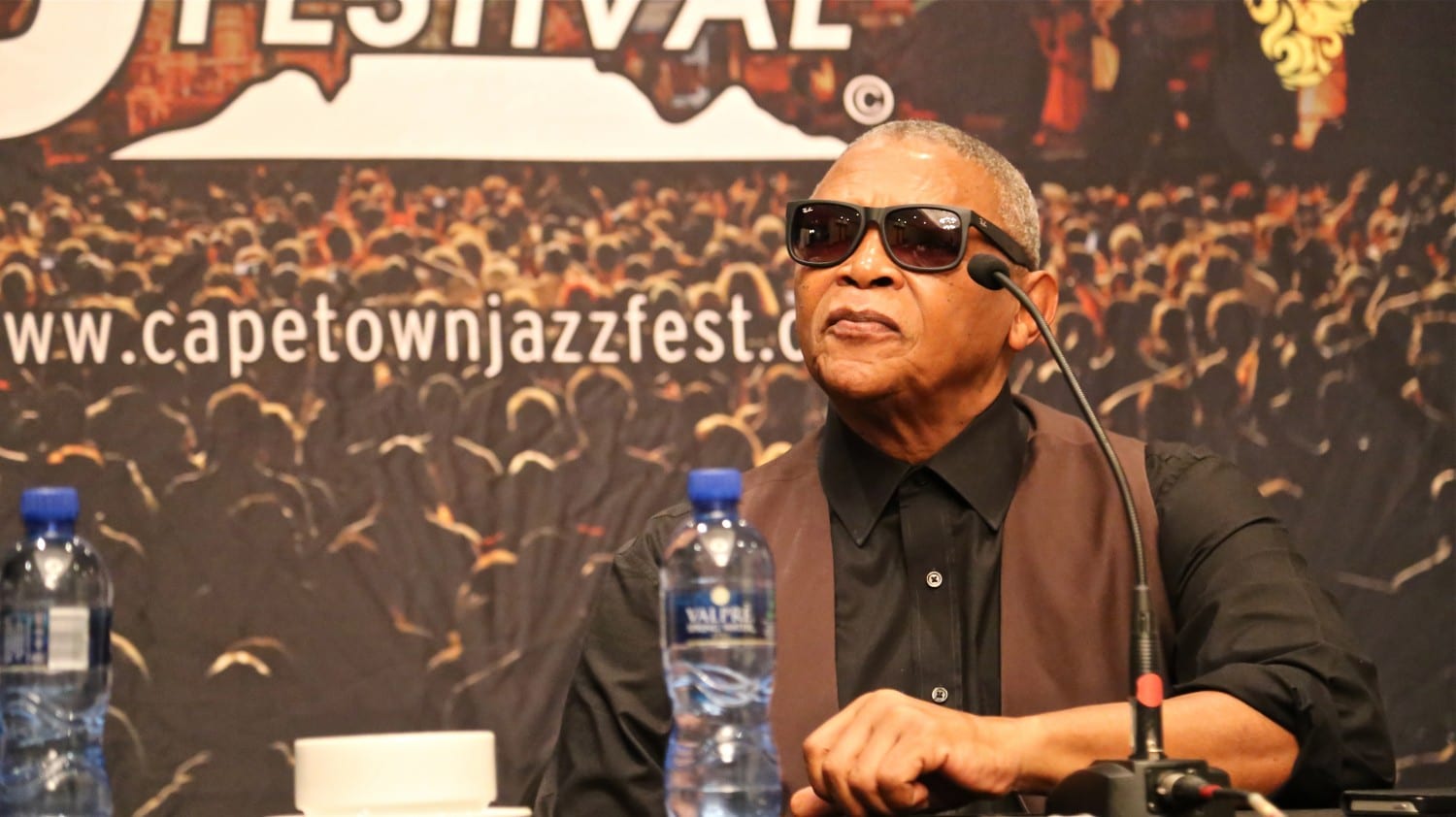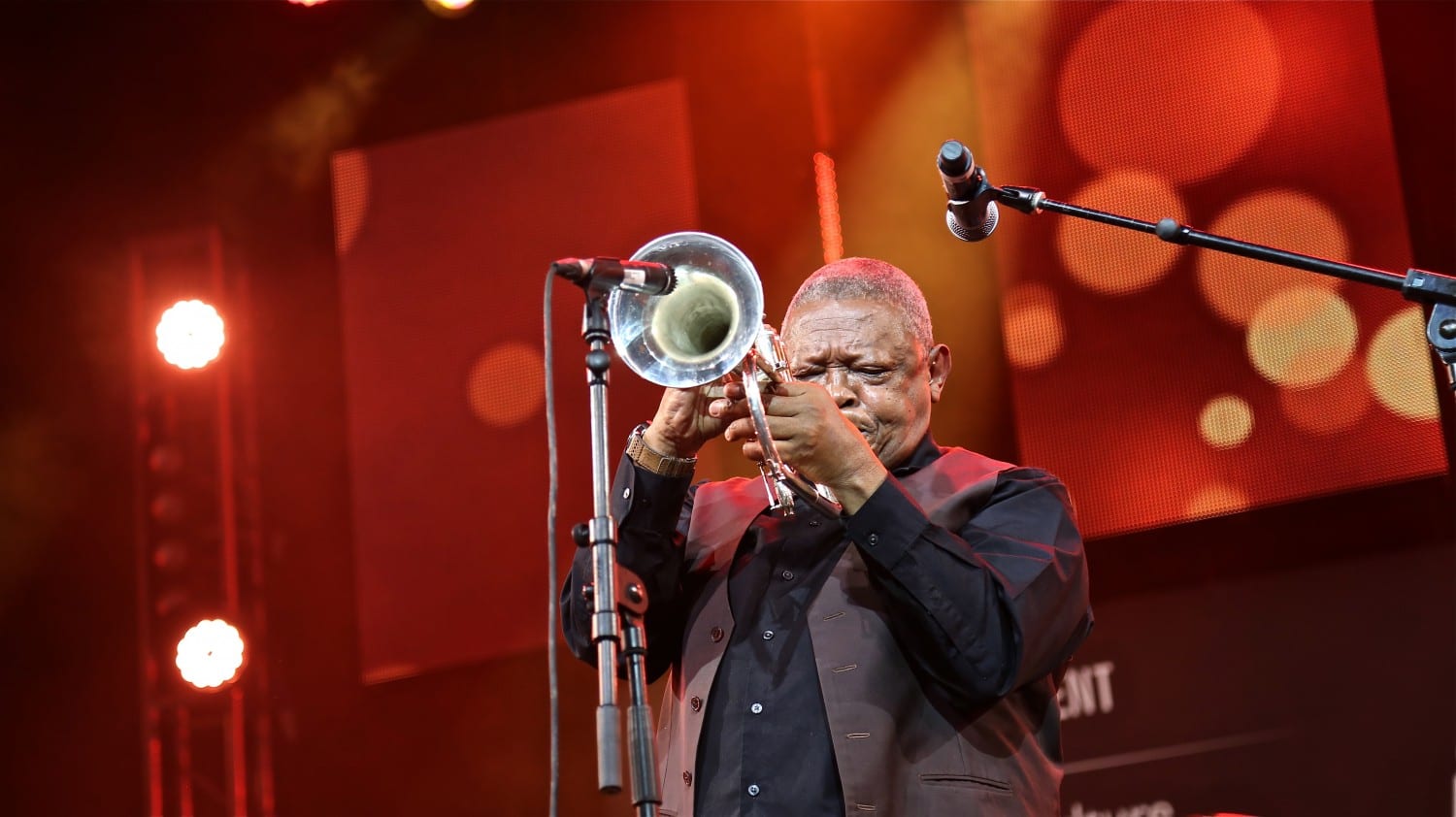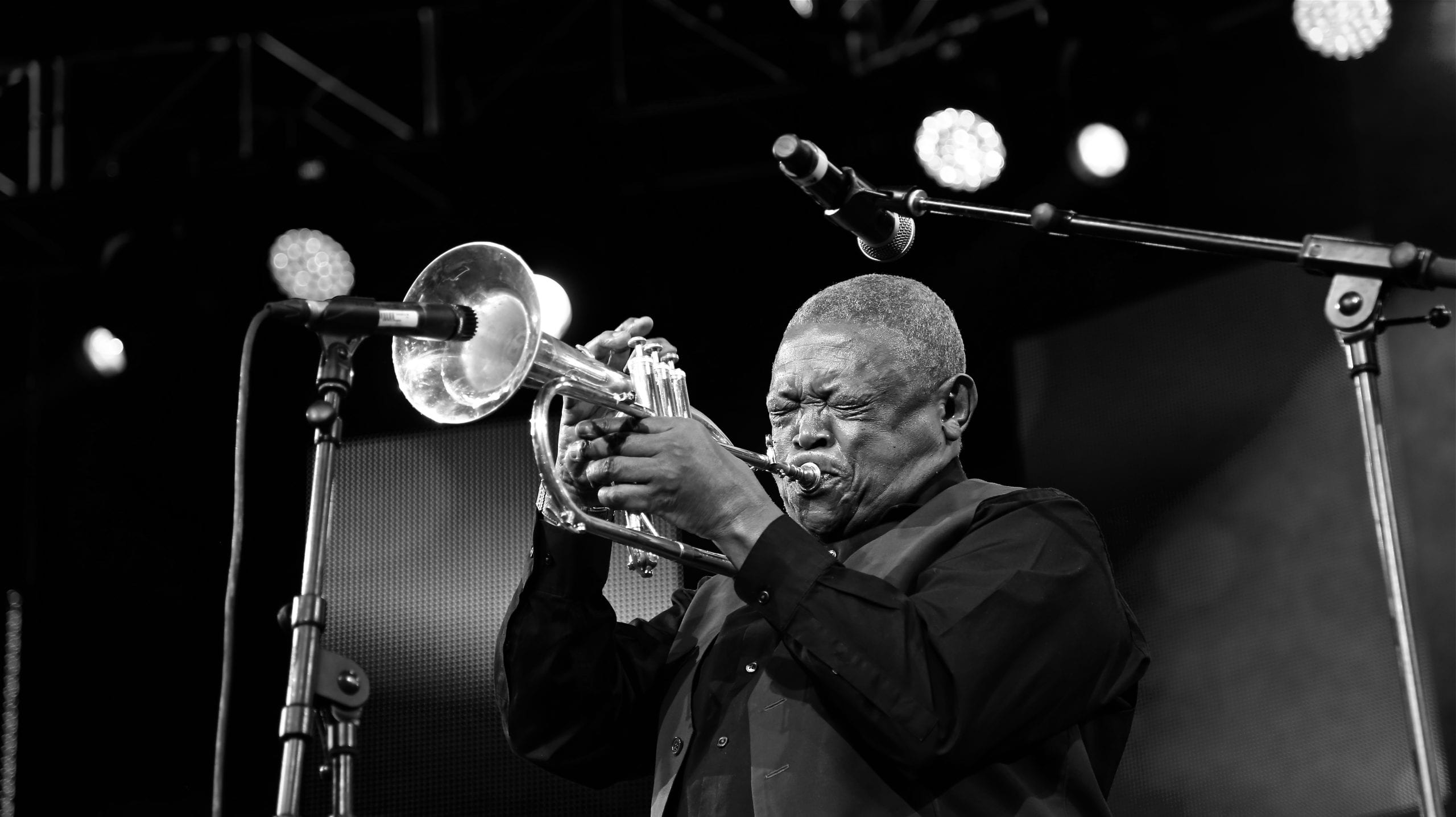Hugh Masekela, perhaps South Africa’s greatest living musical ambassador, has been a prolific musician at the forefront of the world’s music scene for the majority of his 71-year career as a trumpet player.
It would be impossible to list all of the milestones from a career as dynamic and extensive as Masekela’s, but here are a few. As a teenager, he received his second trumpet as a gift from Louis Armstrong, who had heard tell of a young lion blowing tunes in Witbank, a township 80 miles outside Johannesburg.
In 1959, Masekela co-founded the Jazz Epistles, thought to be the first African jazz group to record a full-length LP. His friends Miriam Makeba and Harry Belafonte helped him move to the United States in 1960 to further his studies at the Manhattan School of Music. He would go on to produce hit singles during the 1960s, like the No. 1 hit “Grazing in the Grass,” and would appear at the legendary Monterey Pop Festival in 1967.
He would return to Africa in the 1980s to spearhead the musical arm of the South African anti-apartheid movement, with numbers like “Soweto Blues” and “Bring Him Back Home (Nelson Mandela).” Throughout that time, Masekela constantly refined his trumpet style and combined what he’d learned on the New York jazz scene with his thorough facility in South African folk and pop musics.
Back in his Manhattan School of Music days, Masekela he met piano player Larry Willis. Willis and Masekela have gone on to enjoy an enduring friendship and musical partnership for the last 55 years. Beyond touring together in ensembles of all sizes, the pair has also recorded together. An ensemble led by Masekela and featuring Larry Willis on keyboards recorded the 1972 double LP Home Is Where the Music Is, an entry on Listology’s 1001 Albums You Must Hear Before You Die. These days Masekela and Willis often perform together in a simple duo. They share a love for music of all varieties and their set lists are culled from sources the world over: from West and South African music and traditional healing songs to French classical music and jazz standards.
Masekela and Willis will perform as a duo this Thursday at AMP by Strathmore, in Rockville, with sets at 7 and 9:30 p.m. In anticipation of the performance, I spoke with Masekela to hear his thoughts on his heritage as a musician, the enjoyment of playing with an old comrade like Willis, and the state of music today.
CapitalBop: Can you remember the first time you held a trumpet? How did you discover your passion for music?
Hugh Masekela: Well I’ve been bewitched with music since the time I was a baby. I wasn’t inspired or anything. I was born bewitched by music; like in The Exorcist except I didn’t have to be exorcised. I never could stop singing since I was a baby; I listened to the gramophone; my parents bought me piano lessons when I was 5…and I’ve been a musician for 71 years. There wasn’t any musician that I envied but in my young years I saw a movie about trumpet called Young Man with a Horn and I wanted to play the trumpet. I coaxed my chaplain at my school into getting me a trumpet and he finally did it. And then he got me a trumpet teacher and then in a month’s time I was playing tunes other kids joined…and I’ve been in music ever since. It was no big thing.
CB: What was the musical environment like in Witbank while you were growing up?
HM: There was music all over! There was music all over! We had rural music, we had big bands, we had congas…. Everybody had a Gramophone and everybody was a big record collector. South Africa is a country of great choral composers, great locally composed church music, and we grew up with wedding songs.… There was no TV, so us street children would, you know we had a whole lot of children’s songs and games. There was a whole lot of rural music and workers from all over Southern and Central Africa. SO it was an amazing environment for someone who was bewitched with music.
CB: You first came to the States in 1960 to study classical trumpet at the Manhattan School of Music, after playing bebop with the jazz epistles in South Africa. And I read that while you were in New York you got the chance to learn from Louis Armstrong, Dizzy, and Miles. What are some of the greatest lessons you learned from them?
HM: Oh no, I didn’t learn anything from them. I mean I knew all their records and all their music. It was just a great privilege to be able to go and see live the people who…. You know I was a voracious music collector at the age of 14; I was a serious collector. I knew the music and it was fantastic to be able to be in a place with all these people playing music; all of those records you had and you knew everything about them. I was brought to school my Miriam Makeba and Harry Belafonte, who were on first name basis with all the great people. So I was introduced to them very early in my life. It was also a lot of expectations and pressure, but I came to study; and because I was passionate about music I did well.
CB: How did studying classical music at the Manhattan School of Music influence your playing?
HM: I didn’t start classical music at the Manhattan School; I just became a formal student. You know, I had had the records, gone to classical concerts, and I also had a trumpet from the first trumpet of the Johannesburg Symphony Orchestra long before I came to the states. So I was familiar. I was familiar with music. I was quite well-educated: not only in music, but in other matters as well.
CB: How has your style changed since then? How does your playing today reflect your heritage as a South African musician and classical and jazz musician?
HM: Well I’m not an analyst, you know; I play music because I am passionate about it. And so I practice often and, you know, I’ve gotten better all the time over the years. Music is one of the few professions where you can play for as long as you are healthy. And as long as you are healthy and you practice then you get better. I think I’m playing at my betterest right now because if you stop you won’t ever be able to get it back. An instrument in an inanimate object, so you have to conquer it but you never really…you have to really work at it. But I don’t compare…I appreciate whoever tries to do something that they love and that they’re good at, and make a living from it. I’m not an analyst or a critic, so I’ll never say that they aren’t able to. You know what I mean?
CB: You’ll be playing with Larry Willis, a former student and frequent collaborator of yours, at the show here in DC. You’ve played in ensembles of all sizes and styles but you and Mr. Willis work together particularly often—what do you particularly like about the duo setting? What makes playing with Mr. Willis special for you?
HM: Well we both love music and we love great composers, and we love the music of great composers. We love African music; we’re great scholars of all kinds of music. And we try to make out music as beautiful as possible; we rehearse really hard. We’ve been playing together for 55 years now, on and off. It’s a great partnership and we also have great synergy.

Hugh Masekela. Ignatius Mokone/CapitalBop
CB: What do you think makes that synergy so great between the two of you? What’s the source of that bond?
HM: The source of that is love of music and prowess on our instrument. We teach each other music: He teaches me a lot of songs because he’s a great researcher of great compositions from all over the world. He’ll learn a beautiful song so he can wake me up at 3:00 in the morning. “Hey Larry, I’m sleeping.” “I know, but you’ve got to hear this.” So we have that kind of friendship. We work hard at working hard. [laughs] But it’s not an intellectual thing, we’re not trying to…we’re musicians.
CB: I read that the focus of the show here in DC will be playing standards from the Great American Songbook in your show. Is this accurate?
HM: Well we know all the songs…. We know most of the songs: The Irving Berlins, the Duke Ellingtons, the Cole Porters, and the Hoagy Carmichaels. You know, when you’re in jazz, especially the bebop days, you had to learn all the standards; if you didn’t know them you didn’t get to blow with other musicians. We also have a lot of African music because we started together. We started and the first group we had was together. We’ve studied a wide variety of music. And I believe what we present is what we have learned over the last 55 years together; What we have learned and we have tried to upgrade.
CB: What are some of the numbers can we expect to hear in the set? What meaning do they have to you?
HM: You can hear Louis Armstrong’s “When It’s Sleepy Time Down South” or “Rocking Chair.” You can hear Herbie Hancock’s “Maiden Voyager” or “Cantaloupe Island.” You can hear Miriam Makeba’s traditional, healing songs. You can hear Michel Legrand…We play whatever…We play a wide array of music. And, no. If we love a song we just love it because it’s beautiful; just like you love a painting because you think it’s beautiful. We’re not analytical about what we do; we’re passionate. So we don’t sit there going “What am I doing now? How am I doing now and how am I feeling?” I don’t think any musicians do that, unless, maybe, they’re very theoretical. Maybe songwriters, you know have certain patterns. But we just admire great songwriters. We analyze shit when we’re in school but we’re not in school anymore.
CB: I wanted to ask for your thoughts on the state of jazz today. We don’t often get to hear about jazz in the far corners of the globe, especially in South Africa. Who are the some of the jazz musicians in your country that you are excited for? Who is on the forefront of making engaging, reflective, dynamic music?
HM: My country is the whole world. I admire outstanding musicians in Brazil, in India…and I don’t think about music in terms of jazz because I come from a very dynamic background, you know? I see music more as either “I enjoy it” or “I don’t.” And I don’t criticize anything. I don’t sit there and say “What do I think about jazz today?” because I’ve never thought about it. I just loved what I heard and I picked what I loved. And what happened in 1960 couldn’t happen again. What happened in the times of Bach and Beethoven happened then and it could never happen again. We cannot do it again. It came and it was done by the people who did it, and they did it better than anybody could ever do it again. In music and in art, there’s been just creative periods where new people came in with new stuff and new things. We know there was Dixieland, then there was New Orleans music, then there was something called Swing. Then there was like the Al Capone era, then there was Swing, and then there was bebop. Then there was rock n roll, then there was R&B, and a whole lot of shit came after that: Disco, and more…In the end it’s all music and some of it is not music. But I think that the great age of innovation is gone, and there is very little originality because of technological prowess today. But there are still those people who study their instrument and study their craft; and those that do produce good art.
CB: Is there anyone around today you enjoy listening to, that you think is innovative?
HM: I listen to a lot of people! For the last month I’ve been listening to Papa Wemba and there’s an album called Bakala Dia Kuba that is just amazing! They did it in France, I think, about four or five years ago [Editor’s Note: The album came out in 2001]. And they did it with other Congolese and it’s just, beautiful! I’m studying it and I’m cramming a lot of stuff because I’m fascinated with the art! And those musicians he has are young Zulu musicians called Nouvelle Ecriture and I really admire them. But, you know, I listen to a lot of Michel Legrand. I still play some Ravi Shankar things. There is great folk music that I love. Crosby, Stills, and Nash, who are great friends, I love their music. I love some things that Jimi Hendrix did, I love some Bob Dylan. I’m crazy about a lot Motown things; I think the greatest singer I ever heard was Marvin Gaye…. So I’m all over the place!
CB: I know that this may be a difficult question…
HM: I think those earlier questions are difficult!
CB: Okay, then this may be a really difficult question!
HM: Are you trying to put me in the ground here?
CB: Speaking of today, America is experiencing a growing, racial justice movement and issues of racial injustice not all too dissimilar from ones that South Africa faced for most of its modern history. What role do you think jazz and music more broadly can play in finding understanding and healing today?
HM: I don’t think music can and ever has played a role in upsetting how people were brought up, you know? People were badly brought up from an early age and no amount of music will change how they feel. The hillbilly from the Appalachian Mountains who drinks moonshine and hates n—s, he doesn’t care how beautiful the music I play is. He’s like that. And racial hate is all over the world; it’s one of the human race’s biggest, unfortunate dialogues. It’s human nature. Ever since I was born in 1939, the world has been at war. We come from a very strange species that is just more and more warring. And that has been the history of human beings. Many societies tried to change. Some of them have changed; now that they’ve been able overcome their violent ways. You know, places like Scandinavia gave it up and made it constitutional not to fight. Some people never want to try. Then you have the gangsters and crooks and…there are so many bad people…Then you have them get into politics and they get into power. The history line stems from the Genghis Khans…to the Stalins.… You know there’s been despots all over the world and there still are. And they’ll always be there, I guess…And the media plays on certain events…People are just bad all over the world; the state of the world today is just unbelievable.

Hugh Masekela performs at the 2015 Cape Town International Jazz Festival. Ignatius Mokone/CapitalBop
Unfortunately, and it’s hard for us, we come from a very bad species. For human beings to be good is a very hard thing, historically. So that’s why good people—people who really stand out—are usually not popular, especially among the establishment; Because anybody who is against injustice rubs the establishment in many places the wrong way. So…I mean there are days where I wish I was a dog…chuckles
CB: What role do you think music has in today’s world? What can music do in today’s world?
HM: I really don’t know. The only thing I know is there were instances like…When Africans-Americans came out of slavery, a great part of their redemption came from their prowess out of music; it made people respect them all over the world. The same thing happened with South Africa. To a great extent, It affected people with music; starting with Miriam Makeba and then Black Mambazo, and all kinds of other artists. And then, eventually, Paul Simon and Graceland and stuff like that. But, you know, those are two rare occasions where music created an opening to make people try to look at a certain society as being human beings. But if music could have changed the world then Harry Belafonte and Joan Baez and Peter, Paul & Mary, and Bob Dylan would have changed America long ago. Bob Marley would have changed the world. Those congressmen, in the end, don’t really give a shit about musicians. They don’t like them because they’re not part of the status quo. ![]()








Join the Conversation →